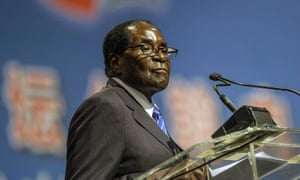
This is no April fool’s joke.
Robert Mugabe’s government is pressing ahead
with a controversial law to force foreign owned businesses to give up
majority control to black Zimbabweans. It has set an April 1 deadline
for all foreign-owned companies to comply or close shop. Household names
like Standard Chartered, British American Tobacco, Anglo American
Platinum and Nestlé, who have operated in the country for decades, could
be affected.
Mugabe’s nephew, Patrick Zhuwao, minister responsible for youth, indigenization and economic empowerment issued the directive last week.
He warned failure to comply will result in licenses being revoked and
there is no room for negotiation. ‘I’m not here to discuss whether
indigenization is good. It’s the law of the land, a fact,’ he said.
And where companies do not cede control, the Zimbabwe government has vowed to go for the assets of directors whose companies fail to submit indigenization plans in order to protect employees who may lose their jobs in the process.
The Indigenization and Empowerment Act was introduced
in 2008 and only came into effect in 2010. It requires foreign
companies valued at more than $500,000 to transfer% of their ownership
to local entities or individuals. The transfers were originally supposed
to be voluntary, but the ZANU PF-led government, impatient at the slow
pace of change, have now resorted to state power to speed up the
process.
Addressing party members in December 2015 at the ZANU PF Annual People’s Congress, Mugabe emphasized:
‘In 2016 we will not accept a company which refuses and rejects our
policy of indigenization and empowerment in the manner we inscribed it.’
Critics like Giannina A. Murphy have argued
that the requirement to cut in black Zimbabweans is a mechanism by the
ruling politicos to transfer wealth to themselves. In such deals,
political connections often matter more than business skills. Most
Zimbabweans have very little prospect of gaining these ownership deals,
management posts, or preferential tenders that a preserve of the elites.
Though the act and
political rhetoric refers to ‘black Zimbabweans’ it is notable that
there are fewer than 30,000 white Zimbabweans in a population of 14
million people. The populist rhetoric is similar to one which Mugabe
introduced in 2000 on land reform laws to reclaim land from white farmers and ultimately led to the collapse of the economy over the last decade.
Zimbabwe remains dramatically unequal. The unemployment rate is hovering above 80%, turning most graduates into street vendors.
The opposition MDC
have accused the government of playing ‘Russian roulette with the
country and its citizens’ economic welfare’ by chasing away foreign
investors instead of embracing them, at a time the country is in
desperate need of foreign direct investment.
While seeking re-election for a seventh term in office in 2013, Mugabe promised to create 2,2 million jobs under an obscure policy called Zimbabwe Agenda for Socio-Economic Transformation (ZimAsset) (pdf).
As a reaction to the growing frustration and disillusionment in
Zimbabwe’s poor communities, ZANU PF have decided to expedite the
indigenization program to appease the masses with economic upliftment.
But the country’s problems are often put down to its leadership. Mugabe 92, has refused to appoint a successor and now runs a ‘kitchen cabinet’ with his wife Grace, and cronies rewarded for their loyalty.
Until last year, there has been a drop
in foreign investment in Zimbabwe over recent years due to the
unpredictable politics and unfriendly investment policies. China has
been Zimbabwe’s major investor in recent years with more than 100
Chinese enterprises operating in the country. The Chinese have registered displeasure
on the pronouncements by their hosts: ‘This policy is extremely unfair
to foreign investors, and will cause losses for them. It also undermines
the credibility of the Zimbabwean government and raises flags to
foreign investors.’

No comments:
Post a Comment